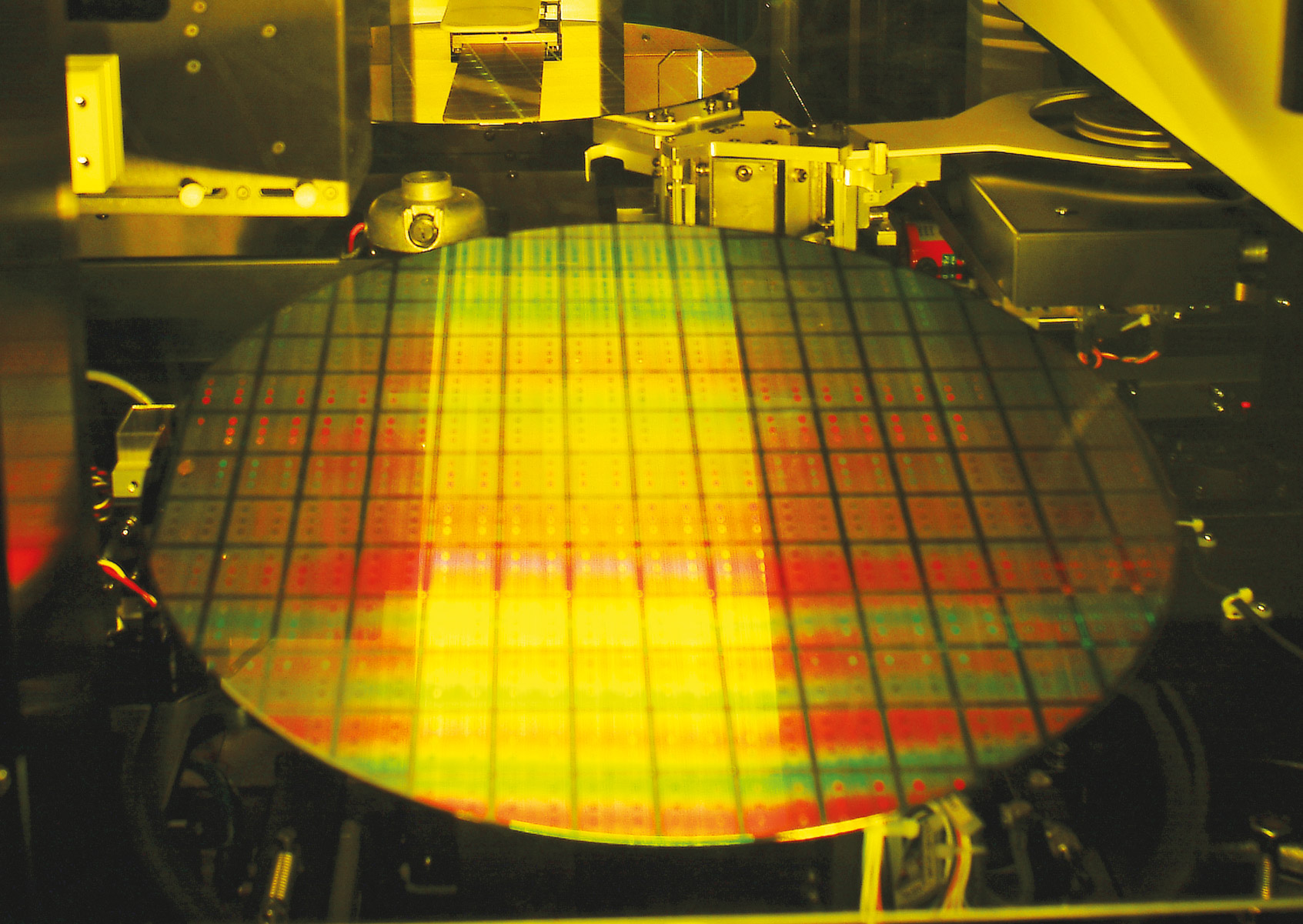
May 2021
All investment strategies have the potential for profit and loss, your or your clients’ capital may be at risk. Past performance is not a guide to future returns.
What is no bigger than your fingernail, something you use multiple times a day but can’t see?
A semiconductor1.
What are the most important technology companies you haven’t heard of?
TSMC and ASML.
To say semiconductors are essential to electronic devices is arguably inane; maybe to say they are essential to everyday life is fairer, and perhaps even closer to the truth is that they are responsible for powering phenomenal technological and societal advancement.
The Keystone Investment Trust seeks to invest in companies whose products and services are providing solutions to global challenges. So, it’s perhaps unsurprising that Tesla (transforming the automotive sector), Moderna (unlocking a new paradigm of medicine) and Safaricom (providing connectivity and access to financial tools in Kenya) are all holdings. But when we say that we own a semiconductor equipment manufacturer (ASML) and semiconductor manufacturer (TSMC), we’re often met with curiosity. In fact, I would argue that the change delivered by Tesla, Moderna and Safaricom would be impossible without the existence of ASML and TSMC. Semiconductors are at the heart of technology, they are the building blocks of the innovation that powers societal progress, and yet they can be overlooked for their importance in driving positive change.
1. Semiconductors are a series of electronic circuits printed onto a conducting material (usually silicon). They form the brains of devices, determining their capabilities and functionality.

In his 2010 Ted Talk, the late and great Hans Rosling recounted the arrival of his family’s first washing machine and his mother saying, “Now Hans, we have loaded the laundry. The machine will make the work. And now we can go to the library,” and went on to energetically tell his audience “Because this is the magic: you load the laundry, and what do you get out of the machine? You get books out of the machines, children’s books. And mother got time to read for me… (and) she got books for herself.” He then went on to thank industrialisation, steel mills, power stations and the chemical processing industry, all of which contributed to making washing machines possible. Semiconductors also play their role in programming washes. Laundry is mundane, but the washing machine is miraculous in saving (predominantly) women the labour of finding, transporting and heating water before the labour of washing, and for freeing up their time to spend on something more enjoyable and productive.
“The cause is hidden. The effect is visible to all”
The Cause:
ASML’s incredibly complex lithography machines2, software and services play a critical role in the manufacturing of semiconductors, enabling its customers to increase the power of semiconductors and lower their costs, helping power what is known as Moore’s Law3. By enabling greater processing capability, ASML is contributing to technological advancement; in reducing the cost of computing power, it is helping democratise access to new and life-changing technologies, whether it be mobile computing, medical devices, electric vehicles or quantum computing.
TSMC manufactures semiconductors – using ASML’s equipment – on behalf of its customers, saving them the significant outlay ($10–15bn) of building a semiconductor factory (or ‘fab’ as they are called in the industry).When it was established in 1987, TSMC disrupted the status quo by paving a way for leading chip companies like NEC and Fujitsu to outsource production, thus saving enormous financial investment and time. Today TSMC’s services allow its customers to focus on their areas of speciality (design) and for the economies of manufacturing at scale to be shared across the industry, hence enabling faster innovation at a lower cost.
The Effect:
The effects enabled by these companies are far reaching and profound, perhaps most importantly in connectivity. ASML and TSMC have played a crucial, but seldom recognised or lauded, role in reaching the milestone of over half of the global population being connected to the internet. Semiconductors made by TSMC using ASML’s equipment have enabled the rollout of network infrastructure (2G, 3G, 4G and now 5G networks) across the globe and price deflation in mobile devices. Connectivity has many benefits. Crucially, it enables greater access to information that can expand knowledge and aid decision making; it provides access to vital tools and services such as an ability to make safe payments and means of transferring money and it brings sellers and buyers together. Connectivity can enable inclusivity and productivity, making it an incredibly powerful tool in addressing poverty.
Semiconductors are powering more than universal connectivity – they are enablers of the energy transition, electrification and monumental change in the healthcare sector where genetics, data and machine learning are helping us understand biology and develop novel diagnostic tools and new paradigms of medicine. So ASML and TSMC are powering positive change in several dimensions and across each of our four positive change themes (Social Inclusion and Education; Environment and Resource Needs; Healthcare and Quality of Life; Base of the Pyramid).
2. Using light, lithography machines print patterns onto silicon wafers to form electronic circuits on the silicon to create the chip.
3. Gordon Moore, co-founder of Intel, predicted in 1965 that the number of transistors on a chip would increase (doubling every year for the first decade and then revised to a doubling every two years) while the cost of components would fall.




Social Inclusion
and Education
MercadoLibre depends on connectivity for its ecommerce business and fintech services.
Alibaba’s ecommerce infrastructure and digital technologies depend upon semiconductors.
Environment and
Resource Needs
John Deere’s See and Spray technology uses sensors, cameras and machine learning to identify what is weed and what is crop, reducing the volume of herbicides used by nearly 80%.
Semiconductor content in EVs is estimated to be twice that of internal combustion engines today, and fully autonomous vehicles of the future could have 8–10x as much semiconductor content by value.
Healthcare and
Quality of Life
Dexcom’s continuous glucose monitors that help diabetic patients better manage their condition use semiconductors in the transmitters and receiving devices.
Patients gain access to Teladoc’s virtual healthcare over mobile devices powered by semiconductors.
Base of
the Pyramid
Safaricom, Kenya’s largest mobile phone operator, uses semiconductors in its mobile network infrastructure and its mobile payments platform, m-Pesa, depends on affordable mobile devices powered by semiconductors.
Semiconductors play a central role in the operation of Bank Rakyat’s 990 ATMs and cash deposit machines and enable its digital banking services.

Interestingly, the cause (semiconductors) of the effect (innovation across multiple industries) is growing in visibility as the confluence of rising demand to support multiple innovations, supply disruptions and escalating political tensions lead to global shortages of these tiny and unseen pieces of tech, with ramifications in a range of industries from auto manufacturing to consumer electronics. TSMC and ASML might not be the most important tech companies you have never heard of for much longer; they might become the most important companies you learn more about.
It is not only the likes of ASML and TSMC that pique the interest of those following positive change, but also companies like MercadoLibre and Shopify. Like ASML and TSMC, this is another cluster of companies we would describe as enablers driving positive change.

The dictionary definition of an entrepreneur is ‘a person who sets up a business or businesses, taking on financial risks in the hope of profit’. MercadoLibre, Latin America’s largest ecommerce and budding fintech company, describes the entrepreneur as ‘the vehicle to achieve an equitable, more democratic economy and to create an authentic transformation in society and on the planet’.
As a company aiding entrepreneurs through providing access to customers, the infrastructure to service customers and the financial tools to operate and grow their businesses, MercadoLibre plays an important role in facilitating job creation, rising incomes and social mobility.
Shopify, much like ASML and TSMC, is another company you are unlikely to have heard of but probably engage with regularly and plays a similar role to MercadoLibre. Shopify provides an operating system for online retailers – it works in the background when we purchase goods online, providing merchants with a means to accept and process payments, engage with customers and ship their products. Shopify wants to lower the barriers to business ownership and to make commerce better for everyone; its founder, Tobi Lütke, is passionate about democratising commerce and empowering independent businesses.
Shopify and MercadoLibre were once micro-businesses – for example, Shopify’s origins stem from the founder’s frustration at the lack of software available to help him set up an online store selling snowboards. It has since grown from a handful of people in a coffee shop to a company powering 1 million businesses which in turn supported 2.1 million full-time jobs in 2019.
By helping small or medium-sized enterprises (SMEs), these companies are helping boost economic growth and a more inclusive world. Around 90 per cent of businesses are ‘formal’ SMEs4, which provide more than 50 per cent of jobs worldwide and contribute up to 40 per cent of GDP in emerging economies; if we were to include the informal sector, the figures would be amplified.
4.There is no standard international definition of an SME. The OECD refers to them as firms employing up to 249 people with micro (1–9), small (10–49) and medium (50–249)
Shades of Grey
The impact of these companies is not always universally positive. For example, semiconductors are used to power military drones and aircraft; rapid innovation cycles create additional demand and consumption for electronic devices; not all information available is accurate or 'good' information; and we are mindful of the environmental impact of increasing consumption facilitated by ecommerce. We are open to these potential negatives but, on balance, we believe technological advancement and inclusive economic growth are inherently positive in driving social progress.

Conclusion
While this cluster of companies might not be immediately obvious contenders for a global impact strategy, we firmly believe they are important enablers of what Hans Rosling described as “the secret silent miracle of human progress”. They are also united by being at the forefront of their areas of expertise with a relentless desire to keep advancing their products and services for the benefit of society. That is to say they are the wave makers, not the wave riders, in their respective fields – our hurdle for inclusion is high. To find and identify them as companies powering positive change requires broad horizons – a willingness to look beyond traditional sector classifications, and an open and inclusive, rather than exclusionary, approach – and an inquisitive attitude to possibilities and controversies. It’s not easy, but then anything worthwhile is seldom easy.
Important Information
The views expressed should not be taken as fact and no reliance should be placed upon these when making investment decisions. They should not be considered as advice or a recommendation to buy, sell or hold a particular investment. If you are unsure whether an investment is right for you, please contact an authorised intermediary for advice.
This article was produced and approved in June 2021 and has not been updated subsequently. It represents views held at the time of recording and may not reflect current thinking.
The trust invests in companies whose products or behaviour make a positive impact on society and/or the environment. This means the trust will not invest in certain sectors and companies and the universe of investments available to the trust will be more limited than other funds that do not apply such criteria. The trust therefore may have different returns than a fund which has no such restrictions.
The trust invests in overseas securities. Changes in the rates of exchange may also cause the value of your investment (and any income it may pay) to go down or up.
The trust's risk could be increased by its investment in unlisted investments. These assets may be more difficult to buy or sell, so changes in their prices may be greater.
The trust invests in emerging markets where difficulties in dealing, settlement and custody could arise, resulting in a negative impact on the value of your investment.
Baillie Gifford & Co Limited is authorised and regulated by the Financial Conduct Authority (FCA). The investment trusts managed by Baillie Gifford & Co Limited are listed UK companies. The Keystone Positive Change Investment Trust is listed on the London Stock Exchange and is not authorised or regulated by the Financial Conduct Authority.
For a Key Information Document for the Keystone Positive Change Investment Trust, please visit our website at www.bailliegifford.com
10203/10001931


